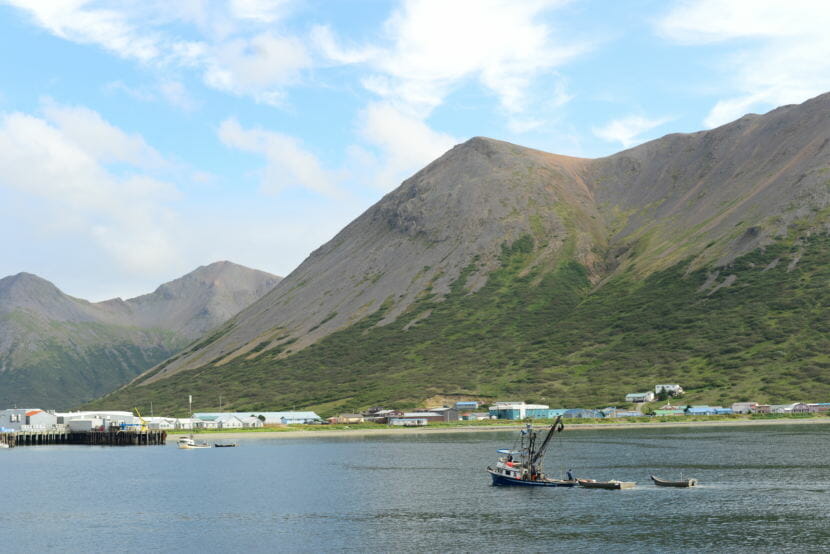
A small eastern Aleutian community is now getting nearly all of its electric energy from renewable sources. With a second hydro facility that began producing power late this spring, the city of King Cove has dramatically reduced its dependence on diesel.
Gary Hennigh has been focused on renewable energy ever since his first city council meeting as King Cove City Administrator in 1989.
“The council said, ‘hey, you’re the new guy and we’re starting to learn something about this hydroelectric potential that we have in the Delta Creek Valley. Can you help us figure out is it something real? Is it good for the community?’” Hennigh said.
Diesel was relatively cheap back then, but Hennigh says the community got fired up when they found out hydro looked like a promising power source for King Cove. In 1994, Delta Creek came online and pretty soon the community was getting half of its power from renewable energy.
But the project was risky. Hennigh says Delta Creek cost $5.7 million. Grants covered a lot of the cost, but the city still had to borrow a couple million dollars to pay for it. He says back in the early 90s that was a big deal for a community the size of King Cove and it paid off.
“Within a couple of years of Delta Creek getting built, it was easy to look back and say, ‘wow’,” Hennigh said. “We were either pretty lucky, pretty smart or a combination of both.”
After seeing Delta Creek’s success, Hennigh says the city started looking into building a second hydro facility. Financing was a challenge. It took more than a decade to finalize the permitting and round-up nearly $7 million. In the end, the city pieced together the funds from a combination of grants, loans and money from their own budget.
Even though it was expensive, Hennigh doesn’t think residents will bear the burden of paying it off in the form of higher utility rates.
“We believe it’s quite the contrary that they’re going to end up paying less,” Hennigh said. “I would hope to be in a position in the next six to 12 months to be able to go to the city council with a rate decrease.”
Right now, one kilowatt hour costs 30 cents in King Cove. It’s one of the lowest rates in rural Alaska. Hydro power covers nearly all of the city’s 4.5 megawatt demand — which includes two boat harbors, public facilities and all homes.
Overall, Hennigh says the community is happy with their commitment to green power.
“We’ve come to know that Mother Nature can be our friend and that renewable energy, at least in King Cove, Alaska, gives us confidence about survivability in the future for all things energy related,” Hennigh said.
But is it possible for other small rural, communities to follow in King Cove’s footsteps?
For the Waterfall Creek project, King Cove got a lot less money than expected from the state. Funding for renewable energy projects has dried up; for the past two budget cycles there have been no grants from the state’s renewable energy fund.
But Cady Lister, of the Alaska Energy Authority, says King Cove made it work, partly because the city has some financial advantages.
“They are small. They are remote,” Lister said. “But they do have sort of an active cash economy in the fishing industry that kind of allows them to access other resources outside of their community that other places might not have the ability to.”
Even so, Lister believes other communities can replicate King Cove’s energy funding. She says King Cove has proved it’s possible to pay for energy projects with more than just grants.
Hennigh says this is likely the end of bolstering King Cove’s hydro facilities, but he’s pushing for 100 percent renewable electricity — like another community in Alaska.
“We have certainly talked about couldn’t we be even better and be like a mini Kodiak,” Hennigh said. “That’s the new challenge”
With strong winds, Hennigh thinks that’s what King Cove will look to next. But they plan on taking it slow with another year of measuring the wind and looking into the economic feasibility of a project.
Correction: This story has been edited to note that King Cove gets most of its electricity from renewable sources, not most of its energy, as a previous version stated.
Zoe Sobel is a reporter with Alaska's Energy Desk based in Unalaska. As a high schooler in Portland, Maine, Zoë Sobel got her first taste of public radio at NPR’s easternmost station. From there, she moved to Boston where she studied at Wellesley College and worked at WBUR, covering sports for Only A Game and the trial of convicted Boston Marathon bomber Dzhokhar Tsarnaev.




